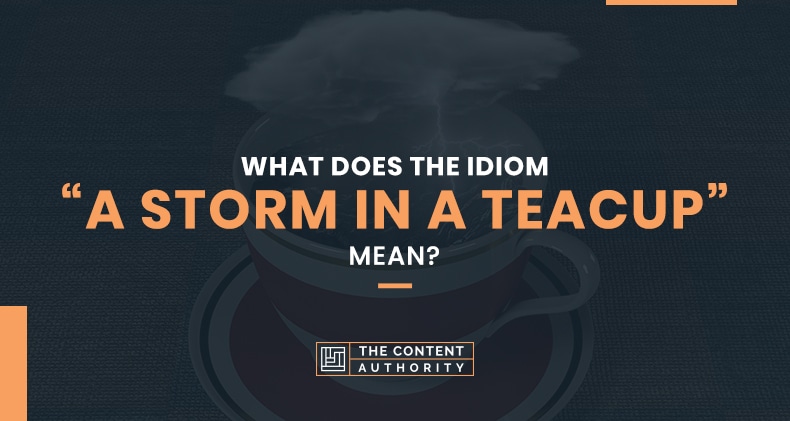Lots of people find the use of idiomatic expressions confusing, especially when they come across an idiom they are unfamiliar with. Are you one of those people who avoid using idiomatic expressions because they do not know the meaning? You have nothing to worry about, the question What Does the Idiom “A Storm In A Teacup” Mean, will be answered extensively.
“A Storm In A Teacup” is an idiomatic expression that is used to describe a situation whereby there is an excessive or unreasonable outburst of displeasure, concern, or anger over a trivial or minor issue. We use this idiom when a person is very annoyed or upset over something of little importance.
We have given you a preamble of what you are to expect from this article on what the idiomatic expression “A Storm In A Teacup” means. Are you wondering what this is all about? In this article, we will tell you all about how to use it when writing.

What Does “A Storm In A Teacup” Mean?
There are lots of misconceptions and complications with the use of idiomatic expressions in sentences and speeches. And when there is no understanding of a particular word, phrase, or sentence, obscurities is what you find. The message that is to be conveyed is not passed across because it is unclear to the recipient.
We hope to avoid obscurities and bring in clarity on what the idiom “A Storm In A Teacup” means and how you can use it correctly in a sentence. You are guaranteed a comprehensive knowledge of this idiom in this article.
Before we go into the details of what the idiom means, we will take a look at the origin of the idiom. There is nothing in our universe without an origin, words, idioms, and proverbs are included.
The origin of a thing usually tells us a lot about that thing, so taking a stroll down memory lane to when the idiomatic expression “A Storm In A Teacup” was first used, we will find a lot of interesting facts about this idiom.
There seem to be a lot of controversies that surround the origin of this idiom, but there are some widely accepted facts about it. In one of the writings of Cicero, the De Legibus in 52 B.C.E, he used the phrase “Excitabat Fluctus In Simpulo,” when translated into English, it means “Stirring Up Waves Or Billows In A Ladle.” An interesting fact is that teas and teacups did not exist at that time.
Then, later in 1678, the Duke of Ormond, the first English man to use the expression made reference to the phrase in a letter to the Arlington’ Earl, and what he wrote was “Our skirmish … is but a storm in a cream bowl.”
Another nobleman referred to Cicero’s phrase, though, he used a new version in an article for The Gentleman’s Magazine in 1830.
Although, the British are not fond of the American version of the idiom, which is “A Tempest In A Teapot,” both are used interchangeably presently. But, the idiom “A Storm In A Teacup” originated from Scotland in the early 1800s.
The version used by the Americans also appears to be of Scottish origin rather than American as the first time it was used happened to be in 1825, in a Scottish magazine known as the Edinburgh Monthly Magazine.
Other languages have a similar idiom, the French say “une tempete dans un verre d’eau” which means “a storm in a glass of water,” the Dutch say “een storm in een glas water” which also means “a storm in a glass of water.”
The Hungarians have a different idiom with the same meaning, “Vihar egy pohár vízben” meaning “a tempest in a potty.” The Spanish make use of the phrase “Una tormenta en un vaso de agua” translated as “a storm in a glass of water.”
Other variations of the idiom are “a tempest in a glass of water,” “a tempest in a teacup,” and “a storm in a wash-hand basin.”
Regardless of the variation of the idiomatic expression you use, the meanings remain the same and they convey the same message.
Having established the origin of the idiom, we will dive into its meaning.
The idiomatic expression “A Storm In A Teacup” is used to refer to an irrelevant or undue outburst of anger, displeasure, or concern over a trivial and negligible incident or scenario.
The idiom is also used to describe when a person is exaggerating a problem or making a small issue seem greater than it is. It is also used to describe great excitement over a minor matter.
So, the idiom “A Storm In A Teacup” is used to describe an event, an issue, or a matter that has been greatly exaggerated. It also describes when there is a lot of trouble over something of little importance or relevance.

Other Idioms
How To Use the Idiom “A Storm In A Teacup”
We will focus on how you can use this idiomatic expression correctly in sentences. How to use it and when to use it. It is imperative you know how to use it correctly and the appropriate time to use it, only then will your sentence convey a message and the recipient understand it.
You use the idiom “A Storm In A Teacup” only when there is a situation and there is an unwarranted outburst of anger, excitement, or pain over a trivial issue. By this, we mean when a person is displaying lots of emotions, which could be excitement, anger, pain, or concern over something of little importance and value.
The idiom can also be used when there is an exaggeration of a small event or problem; when a small issue has been blown out of proportion. It is also used when there is a disagreement between two people or groups over a very minor issue or matter.
When a person is over-reacting toward a small and insignificant event or something trivial done by another person, you can use the idiom “A Storm In A Teacup,” which is the perfect description of that situation.
You can also use the idiom when a person is causing a lot of trouble over something of little importance. You must understand that the idiom is not used only when a person is displaying an outburst of anger or pain. It is also used when there is a lot of excitement, worry, concern, or happiness, especially when it is undue and unwarranted for the situation.
Now, we have established the origin, the meaning, when, and how to use the idiomatic expression “A Storm In A Teacup” correctly, we will dive into examples of it.
Illustrative Examples of the Use of the Idiom “A Storm In A Teacup”
We have identified all we need to know about the idiom, so we will help ourselves with a few examples for better clarity.
- After John left the neighborhood, he realized some of the stories he heard that caused a lot of excitement among his siblings were no more than a storm in a teacup.
- The controversy around the two popular political parties was caused by an anonymous person who started a storm in a teacup by spreading rumors about both parties.
- Halsey claimed she still had the feeling that it may be a minor misunderstanding among the brothers causing a storm in a teacup.
- All a storm in a teacup, and it would be discovered that there was no reality in those stories! That would be an unfortunate incident.
- The class was skeptical believing the tales their teacher told, but it may be all a storm in a teacup.
- David is aware of how much Emmanuel likes you. He said all the disagreements is nothing but a storm in a teacup. It will soon be over.
- For all the noise made by revolutionists, the events held over the weekend had all the intensity of a storm in a teacup.
- The protests held by the labor union are nothing else but a storm in a teacup that’s been fueled by a media house conveying wrong information.
- The feud between the hood gangs and the police was nothing but a storm in a teacup. Although, it took the intervention of the local authorities to resolve it.
- The contention brewing in the office was just a storm in a teacup and no one was interested in the outcome.
The examples we have given should provide you with an insight into how you can use the idiom “A Storm In A Teacup” correctly in a sentence.

Final Thoughts
Thou understandable, there is no reason why there should be confusion on the use of the idiomatic expression “A Storm In A Teacup.” Even if you were confused, we are certain that all confusion has been cleared up with this article. We have broken down the idiom for easy understanding.
Shawn Manaher is the founder and CEO of The Content Authority. He’s one part content manager, one part writing ninja organizer, and two parts leader of top content creators. You don’t even want to know what he calls pancakes.

